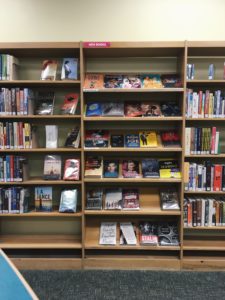Becca Quon (@beccaquon) is DLF’s Program Associate for Advancement and Awards, and attended the ‘Digital Blackness in the Archive: A Documenting the Now Symposium‘ on December 11-12, 2017.

As a recent iSchool graduate and the youngest person working at CLIR-DLF, I can say that by now, I’ve gotten used to walking into a room full of people with a passion and work ethic that make my head spin, plopping myself in a corner, and–well– absorbing as much as I can. It’s one of the great pleasures of my work that I’m constantly privy to conversations in the office, within the DLF community, and abroad that make me want to high five everyone and exclaim ‘YES! That’s amazing. You’re doing incredible things.’ That was absolutely the case when I attended the Digital Blackness in the Archive symposium in Missouri last month, which brought together DocNow community members to “address issues at the intersection of archival practice and the existence of Black people on the web and social media”.
If you haven’t had the chance to listen to any of the recorded sessions yet, I encourage you to spend some time with the first panel, in which three community organizers spoke about their experiences during and in the years following the protests in Ferguson in 2014. These activists, Kayla Reed, Brittany Ferrell, and Alexis Templeton, shared moving and deeply personal takes on their work, the Black experience, and community memory that foregrounded a deep respect for communities in upheaval as a central focus of the Documenting the Now project.
The second panel turned the mic over to digital black culture researchers, who touched on many archives-related challenges from their perspective: the ethics of collecting social media posts and related data, the need for tools that place tweets in context, and ways these platforms can help researchers visualize communities.
The third focused on the nature of collecting and representation within collections–who gets represented when collecting decisions are made? And what are the collector’s responsibilities to them? One set of questions posed by panelist Tonia Sutherland (@toniasutherland) really stuck with me as representative of the work the DocNow team has done:
[tweet https://twitter.com/CollardStudies/status/940680727871524864]
I was asked a few times over the course of the symposium “so why’s DLF here?” Though we’re not part of the Documenting the Now project, we’re very much fans of the effort being put into it, and of the example being set. As Bergis Jules, who co-created the project, said in his (DLF-hosted) 2017 NDSA Digital Preservation keynote on ‘Confronting Our Failures of Care Around the Legacies of Marginalized People’, it’s necessary for information professions to “model our work after projects, organizations, or institutions that are already doing people centered work.”
[tweet https://twitter.com/CollardStudies/status/940737063183421440]
Something I’ve noticed perpetually about the practitioners who work under the DLF umbrella is the motivation to create the community they want to be a part of–something that DLF’s executive director also thinks about often, as she frames thoughtfully in a piece she wrote on building capacity through care, and that I try to bring to my desk everyday, too. Intentionality was a word I heard a lot over the course of the meeting, and it’s one that, I think, should drive the work we all do as information professionals and organizers. Sharing our space at the table, or even stepping back to let others speak, is necessary in order to help us listen (and design, and do) better.
[tweet https://twitter.com/amplify285/status/940678029902254082]
Nobody should have to bring their own chair.
So, DocNow team? YES! #BlackDigArchive was amazing. You’re doing incredible things. High fives all around.
[tweet https://twitter.com/documentnow/status/941802086232047616]
